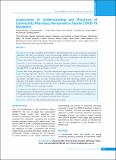Please use this identifier to cite or link to this item:
https://hdl.handle.net/20.500.14356/978Full metadata record
| DC Field | Value | Language |
|---|---|---|
| dc.contributor.author | Khadka, Sitaram | - |
| dc.contributor.author | Neupane, Gyata | - |
| dc.contributor.author | Yadav, Gopal Kumar | - |
| dc.contributor.author | Sharma, Arun | - |
| dc.contributor.author | Giri, Santoshi | - |
| dc.contributor.author | Amgain, Kapil | - |
| dc.contributor.author | Bhushal, Arjun | - |
| dc.contributor.author | Basnet, Bhaikaji | - |
| dc.date.accessioned | 2023-04-18T09:50:23Z | - |
| dc.date.available | 2023-04-18T09:50:23Z | - |
| dc.date.issued | 2022 | - |
| dc.identifier.citation | KhadkaS., NeupaneG., YadavG. K., SharmaA., GiriS., AmgainK., BhushalA., & BasnetB. (2023). Assessment of Understanding and Practices of Community Pharmacy Personnel to Tackle COVID-19 Pandemic. Journal of Nepal Health Research Council, 20(3), 739-745. https://doi.org/10.33314/jnhrc.v20i3.4388 | en_US |
| dc.identifier.issn | Print ISSN: 1727-5482; Online ISSN: 1999-6217 | - |
| dc.identifier.uri | http://103.69.126.140:8080/handle/20.500.14356/978 | - |
| dc.description | Original Article | en_US |
| dc.description.abstract | Abstract Background: The skill, accessibility, and knowledge of community pharmacists have been paramount in managing pandemics. This study was conducted to assess the knowledge, attitude, and practice of community pharmacy personnel towards tackling COVID-19 pandemic which might help concerned authorities to take effective actions to eliminate the gaps for the management of such pandemic in an efficient way. Methods: A cross-sectional study was conducted among 428 community pharmacy personnel from different community pharmacies in Kathmandu, Nepal from December 2021 to February 2022. Statistical analysis was done through SPSS® v21 and MedCalc for Windows v12.3.0. Results: Most of the participants (42.76%) had certificate-level degrees in their respective fields and one to five years of working experience (48.84%). Only 29.67% of the respondents had good knowledge towards tackling COVID-19, whereas good attitude and practice were demonstrated by 59.11% and 42.29% respectively. The participants with higher degrees and more working experience had better knowledge, attitude, and practice. Education level bachelor and above was independent predictor of good knowledge (OR 20.69, 95% CI 11.30-37.90). Knowledge and practice (Spearman’s rho: 0.135; P ≤0.005) and attitude and practice (Spearman’s rho: 0.095; P = 0.049) scores were positively correlated. Conclusions: The significant association of community pharmacy personnel’s educational level with knowledge, attitude, and practices demands the necessity of policy-making bodies’ involvement for the mandatory presence of well-qualified pharmacists and regular training at the community pharmacy level. Furthermore, it is high time to reinforce the drug regulatory acts, regulations, and codes all over the nation. Keywords: COVID-19; Nepal; pandemics; pharmacy; policy making. | en_US |
| dc.language.iso | en | en_US |
| dc.publisher | Nepal Health Research Council | en_US |
| dc.relation.ispartofseries | July-Sep, 2022;4388 | - |
| dc.subject | COVID-19 | en_US |
| dc.subject | Nepal | en_US |
| dc.subject | pandemics | en_US |
| dc.subject | pharmacy | en_US |
| dc.subject | policy making | en_US |
| dc.title | Assessment of Understanding and Practices of Community Pharmacy Personnel to Tackle COVID-19 Pandemic | en_US |
| dc.type | Journal Article | en_US |
| Appears in Collections: | Vol 20 No 3 Issue 56 july-Sep, 2022 | |
Files in This Item:
| File | Description | Size | Format | |
|---|---|---|---|---|
| 4388-Manuscript-30786-1-10-20230314.pdf | fulltext download | 278.6 kB | Adobe PDF |  View/Open |
Items in DSpace are protected by copyright, with all rights reserved, unless otherwise indicated.
